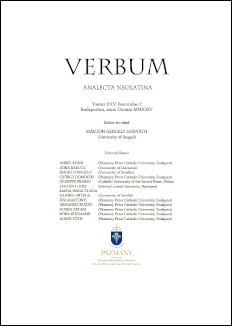Il Presidente o la Presidente del Consiglio? Polemiche intorno alla scelta di Giorgia Meloni
Published 31-12-2024
Keywords
- professional nouns,
- morphology,
- language policy,
- grammatical gender,
- feminines
How to Cite
Copyright (c) 2025 Gergely Kadvány

This work is licensed under a Creative Commons Attribution 4.0 International License.
Abstract
The interaction between linguistic and social change is a very important area of research in sociolinguistics. Certain elements of the language system are considered to be a reflection of social relations, when these are subject to change, their linguistic representations may also undergo changes. In turn, the language system and its use have an impact on society. In recent decades, the dynamics of this two-way interaction is evidenced in Italian morphology by the use of the gender of professional nouns, which are closely influenced by certain social transformations. To prove this, in my article I will present an extremely current case: the debate created around the choice of Giorgia Meloni, the first woman Prime Minister in Italian history, to be called il Presidente del Consiglio (masculine form). The article will show how this choice is reflected in various online newspapers and other social media platforms, confirming how changes in society can influence the linguistic system itself and how the resulting change becomes part of the accepted linguistic norm.
References
- Corbett, G. G. (1991): Gender. Cambridge: Cambridge University Press. https://doi.org/10.1017/CBO9781139166119
- Corbett, G. G. (2006): Agreement. Cambridge: Cambridge University Press.
- Dardano, M. & P. Trifone (1995): Grammatica italiana. Con nozione di linguistica, vol. III. Bologna: Zanichelli.
- Frati, A. (2023): La presidente dell’Accademia della Crusca: Ancora sul femminile professionale. Italiano digitale 24(1): 182–183. https://doi.org/10.35948/2532-9006/2023.27976
- Gheno, V. (2020): Si dice avvocata o avvocato? Il dibattito è aperto… Ma per la sociolinguista non ci sono dubbi: “Si dice avvocata”. Intervista da: Francesca Spasiano. Il Dubbio, 3 settembre 2020, https://www.ildubbio.news/2020/09/03/si-dice-avvocata-o-avvocato-il-dibattito-e-aperto-ma-per-la-sociolibguista-non-ci-sono-dubbi-si-dice-avvocata/.
- Gheno, V. (2021): Quali parole usare nel calcio femminile? Intervista alla sociolinguista Vera Gheno. Intervista da: Giulia Beghini. L Football – Il Magazine del Calcio Femminile, 1 aprile 2021, https://www.lfootball.it/2021/04/linguaggio-di-genere-calcio-femminile-intervista-vera-gheno.
- Gygax P. M., D. Elmiger, S. Zufferey, A. Garnham, S. Sczesny, L. von Sockhausen, F. Braun & J. Oakhill (2019): A Language Index of Grammatical Gender Dimensions to Study the Impact of Grammatical Gender on the Way We Perceive Women and Men. Frontiers in Psychology 10: 1604. https://doi.org/10.3389/fpsyg.2019.01604
- Kadvány, G. (2022): I nomi di professione al femminile: arbitro, assessore o arbitra, assessora? Una questione di morfologia o di politica linguistica? In: K. Dávid, L. Marmiroli, E. Sermann & A. Zentainé Kollár (eds.) Studi e ricerche d’italiano sul Danubio e oltre: L’italianistica in Europa centrale e centro-orientale. Szeged: Szegedi Tudományegyetem BTK Olasz Tanszék. 271–277.
- Latos, A. (2017): Il ministro è tuttora incinta? Fra la norma, l’uso e il parlante. In: N. Chwaja, A. Liszka-Drążkiewicz, M. Nowakowska & J. Woźniakiewicz (eds.) 237 Annales Universitatis Paedagogicae Cracoviensis Studia de Cultura 9(3): 54–64. https://doi.org/10.24917/20837275.9.3.6
- Lavinio, C. (2021): Generi grammaticali e identità di genere. Testo e Senso 23: 31–42. https://testoesenso.it/index.php/testoesenso/article/view/515
- Lepschy, G. (1989): Nuovi saggi di linguistica italiana. Bologna: Il Mulino.
- Robustelli, C. (2010): L’uso del genere femminile nell’italiano Contemporaneo: Teoria, prassi e proposte. In: M. Cortelazzo (ed.) Politicamente o Linguisticamente Corretto? Maschile e Femminile: Usi Correnti Della Denominazione di Cariche e Professioni. Atti della X giornata della rete per l’eccellenza dell’italiano istituzionale (REI). Bruxelles: Commissione Europea. 1–18.
- Robustelli, C. (2023): Donne al lavoro (medico, direttore, poeta): ancora sul femminile dei nomi di professione. Italiano digitale 24(1): 187–190. https://doi.org/10.35948/2532-9006/2023.27978
- Rymes, B. & A. R. Leone (2014): Citizen Sociolinguistics: A New Media Methodolgy for Understanding Language and Social Life. Working Papers in Educational Linguistics 29(2): 25–43.
- Sabatini, A. (1987): Il sessismo nella lingua italiana. Commissione Nazionale per la realizzazione della parità tra uomo e donna, Roma, Presidenza del Consiglio dei Ministri.
- Thornton, A. M. (2004): Mozione. In: M. Grossmann & F. Rainer (eds.) La Formazione Delle Parole in Italiano. Tübingen: Niemeyer. 218–227.
- Thornton, A. M. (2022): Genere e igiene verbale: l’uso di forme con ə in italiano. Annali Del Dipartimento Di Studi Letterari, Linguistici E Comparati. Sezione Linguistica 11: 11–54. https://doi.org/10.6093/2281-6585/9623


